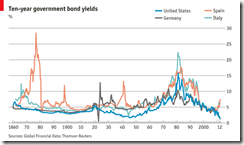The era of Japan’s low interest rates may be at an inflection point.
From San Francisco Chronicle/Bloomberg,
Japan’s public pension fund, the world’s largest, said it has been selling domestic government bonds as the number of people eligible for retirement payments increases.
“Payouts are getting bigger than insurance revenue, so we need to sell Japanese government bonds to raise cash,” said Takahiro Mitani, president of the Government Pension Investment Fund, which oversees 113.6 trillion yen ($1.45 trillion). “To boost returns, we may have to consider investing in new assets beyond conventional ones,” he said in an interview in Tokyo yesterday.
Japan’s population is aging, and baby boomers born in the wake of World War II are beginning to reach 65 and become eligible for pensions. That’s putting GPIF under pressure to sell JGBs to cover the increase in payouts. The fund needs to raise about 8.87 trillion yen this fiscal year, Mitani said in an interview in April. As part of its effort to diversify assets and generate higher returns, GPIF recently started investing in emerging market stocks.
GPIF is historically one of the biggest buyers of Japanese debt and held 71.9 trillion yen, or 63 percent of its assets, in domestic bonds as of March, according to the fund’s financial statement for the 2011 fiscal year. That compares with 13 percent in domestic stocks, 8.7 percent in foreign bonds and 11 percent in overseas equities.
Again the above represents the unintended consequences of the unsustainable welfare state. These could be incipient signs of the liquidation of Japan’s Santa Claus political institutions.
The lack of internal financing (from resident savings) means that Japan’s enormous debts will need to be financed by external (foreign) savings. This also means that Japan will be in tight competition with the Eurozone and the US to attract financing from the world. The nuclear option is that the Bank of Japan (BoJ) will become the financier of last resort.
Neo-Keynesians and Fisherians who claim that the world will undergo prolonged episodes of low interest rates based on historical experiences and from the prospects of deflation, fail to see that this has NOT just been about banking financial crisis, but about the crises of governments manifested through unsustainable debts.
Most of their analysis has been moored to historical banking-financial crisis, e.g Great Depression and Japan’s lost decade, rather than government debt crises.
It is dangerous to read the recent past as roadmap of the future. The above chart from the Economist shows that interest rates of major economies (US Germany Spain and Italy) had their volatile chapters.
When there will be inadequate or scant access to private sector savings, then the chances for a full blown debt crisis becomes a clear and present danger.
Once interest rates rises—out of the lack of financing and or from BoJ’s inflation financing—higher rates would mean higher interest rate payments which is likely to swell the existing debts.
Yet given the Japan's insufficient economic growth from growing political interventionism, surging interest rates will negatively impact both Japan’s banking and financial system as the largest holders of JGBs and Japan’s government—a self-reinforcing spiral.
So the debt crisis, which has already been ravaging the Eurozone, may likely be transmitted to Japan. Unfolding events have been so fluid which means conditions may deteriorate swiftly beyond the public's expectations.
Be careful out there.

No comments:
Post a Comment